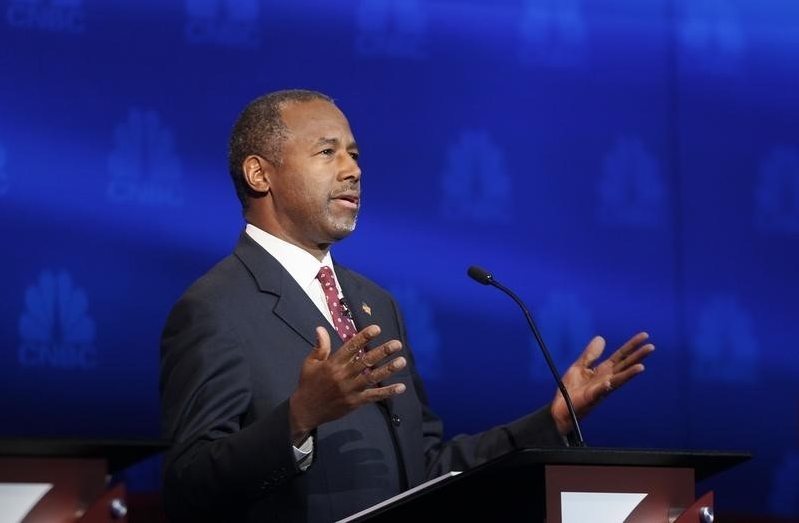
Republican presidential candidate Ben Carson's campaign said on Friday he never applied nor was accepted to the U.S. Military Academy at West Point, apparently contradicting an account in Carson's autobiography that he had been offered a full scholarship by the prestigious school.
The admission, following doubts over some of Carson's other recollections of his youth, could be a setback for the 64-year old retired neurosurgeon's campaign, even as he is tied with rival Donald Trump at the top of Republican presidential primary polls.
The details of a scholarship were included in Carson's account of a meeting with General William Westmoreland in 1969 when Carson was a high school student in the ROTC program, which provides preliminary military training for students interested in becoming officers.
"His Senior Commander was in touch with West Point and told Dr. Carson he could get in, Dr. Carson did not seek admission," campaign spokesman Doug Watts told Reuters in an email.
In Carson's 1990 autobiography, 'Gifted Hands,' he wrote: "Later I was offered a full scholarship to West Point." He added that despite turning the offer down, "As overjoyed as I felt to be offered such a scholarship, I wasn't really tempted."
Carson's campaign said on Friday that his grades and conversations with ROTC officials constituted a de facto acceptance to the academy, which provides full scholarships to all of its students.
"Dr. Carson, as the leading ROTC student in Detroit, was told by his Commanders that he could get an Appointment to the Academy," Watts said. "He never said he was admitted or even applied."
West Point confirmed on Friday there was no record of Carson completing an application for admission. It is possible someone nominated him for the academy, but that would only have been an early step in the multi-part process of admission.
"Candidate files where admission/acceptance was not sought are retained for three years; therefore we cannot confirm whether anyone during that time period was nominated to West Point if they chose not to pursue completion of the application process," West Point spokeswoman Theresa Brinkerhoff said in an email to Reuters.
The differing accounts of Carson's West Point scholarship were first reported by political news website POLITICO, which headlined its story 'Ben Carson admits fabricating West Point scholarship.'
Carson's campaign contested that interpretation.
"The Politico story is an outright lie," Watts said in an email to Reuters. "The campaign never 'admitted to anything.'"
The fracas over West Point came only hours after Carson attacked the media for what he called a "bunch of lies" as he faced questions on Friday about his accounts of his violent past.
Carson, who is popular with evangelical voters, often speaks on the campaign trail about his flashes of violence during his youth, casting the lessons he learned from that period as evidence he has the strength of character to be president.
In his autobiography, the renowned brain surgeon wrote that as a teen, he tried to stab a friend named Bob in the stomach with a knife but was stopped by the boy's belt buckle.
On Thursday on the campaign trail, when pressed by reporters about the incident and also in an interview with Fox News, Carson said that Bob's name, along with some other names in the autobiography, were pseudonyms that he used to protect the privacy of the people he was writing about.
He described Bob in the book as a friend and classmate. In the Fox News interview and on CNN, Carson said the boy was a "close relative."






